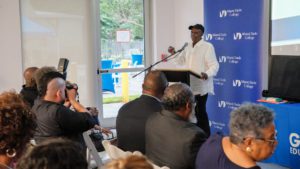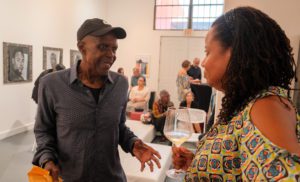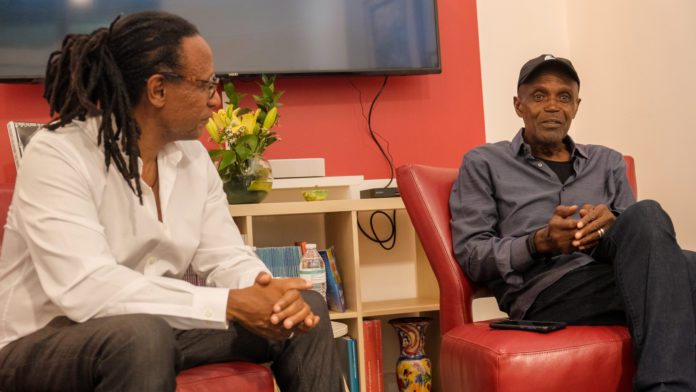|
Getting your Trinity Audio player ready...
|
Bahamian filmmaker Jeffrey Poitier, nephew of the late Academy Award- winning actor Sidney Poitier, recently premiered his latest film to a rapt audience at the Miami-Dade Gibson Center building in the recently designated “Little Bahamas of Coconut Grove.” Entitled Voices, the film is a compilation of oral histories of residents of West Coconut Grove, which includes interviews with early pioneers of one of Miami’s oldest neighborhoods. Mr. Poitier provides the eloquent narration for Voices, which touches upon the past, present and future of what is now known as Little Bahamas of Coconut Grove.
The film highlights the many contributions made by the strong, self- sustaining Bahamian community founded in West Coconut Grove in the early 1900s that has persevered despite systemic disenfranchisement and displacement. Over the past eight years, Mr. Poitier has filmed more than 500 hours of video with hundreds of Little Bahamas citizens and has plans to create a multi-part series for educational purposes and viewing on television. The hope is that students and faculty of Florida International University will edit and create the series under the direction of Rebecca Friedman, Director of FIU’s Wolfsonian Public Humanities Lab.
 “My great uncle James Poitier moved to Coconut Grove from Cat Island in 1913,” explained Mr. Poitier. “He bought land, cleared it and built himself a house on the corner of Oak Avenue and Douglas Road. He helped build the Coconut Grove Playhouse, the management of which refused entry to my uncle Sidney Poitier three different times when he was a teenager growing up in Miami.
“My great uncle James Poitier moved to Coconut Grove from Cat Island in 1913,” explained Mr. Poitier. “He bought land, cleared it and built himself a house on the corner of Oak Avenue and Douglas Road. He helped build the Coconut Grove Playhouse, the management of which refused entry to my uncle Sidney Poitier three different times when he was a teenager growing up in Miami.
“We are lucky to have had the opportunity to capture the stories of these pioneers. There is something magical about their words and it is important for today’s generations to hear them,” he said.
Bahamian elders have long recounted stories of family ancestors who built boats and sailed to South Florida, where they raised and sold crops to the newly arrived white settlers. Many men cleared land for development and some founded their own businesses, while women often worked in white family homes as maids and nannies.
 Their stories, which have been passed down for generations, detail how they sent money back to their families in the Bahamas, faced racial discrimination in Miami and through hard work built a thriving community of social organizations, churches and schools.
Their stories, which have been passed down for generations, detail how they sent money back to their families in the Bahamas, faced racial discrimination in Miami and through hard work built a thriving community of social organizations, churches and schools.
Today, the residents of the West Grove are under intense pressure from developers to sell their family homes in order for expensive luxury homes to be built in Little Bahamas. As with the community of Little Haiti, the Grove’s Little Bahamas is becoming gentrified and its longtime residents displaced due in part to steadily rising property taxes.
Miami Commissioner Ken Russell, who has consistently sponsored legislation focused on ensuring affordable housing, spoke at the film screening about the commission’s plans to protect the future of Little Bahamas.
 “You’re going to see major financial contributions to large stakeholders in this community. You’re going to see subtle changes in zoning for large areas for affordable housing. We’re going to make sure that we are not displacing one single resident, and that we are building anew for those who live here now and those who want to come back,” said Mr. Russell.
“You’re going to see major financial contributions to large stakeholders in this community. You’re going to see subtle changes in zoning for large areas for affordable housing. We’re going to make sure that we are not displacing one single resident, and that we are building anew for those who live here now and those who want to come back,” said Mr. Russell.
And United States Representative Frederica Wilson continues to champion efforts to protect the Little Bahamas community through her work in Washington D.C.
The October 15th screening of Voices was presented by the Wolfsonian Public Humanities Lab at Florida International University and was co- sponsored by the Office of Miami Commissioner Ken Russell and the Thelma Gibson Health Initiative. A second screening took place at Little Haiti’s IPC Artspace curated and directed by award-winning Miami Herald photojournalist Carl-Philippe Juste, a strong supporter of Little Bahamas. Mr. Juste and Mr. Poitier engaged in a lively conversation about gentrification and migration and the building of community across neighborhood lines.
“These two events, including not only the film screenings but also the conversation between Carl and Jeffrey, reflect the work that we all collaboratively try to do every day, said Rebecca Friedman of FIU’s Wolfsonian Public Humanities Lab. “The preservation of the past and understanding its present and future resonances will undoubtedly contribute to the creation of equity and serve as a weapon against persistent racism in our communities and around the nation. This is the hope.”






